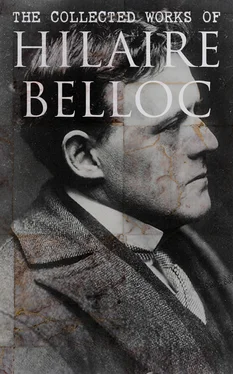In all this turmoil the governing centre of the country, the Committee of Public Safety, not only kept its head but used the enormous forces of the storm for the purposes of achieving military success, under that system known as "the Terror," which was for them no more than martial law, and an engine of their despotic control. Of the two thousand and more that passed before the revolutionary tribunal and were executed in Paris, the large majority were those whom the Committee of Public Safety judged to be obstacles to their military policy; and most were men or women who had broken some specific part of the martial code which the Government had laid down. Some were generals who had failed or were suspected of treason; and some, among the most conspicuous, were politicians who had attempted to check so absolute a method of conducting the war.
Of these the greatest was Danton. Before the end of 1793 he began to protest against the system of the Terror; he believed, perhaps, that the country was now safe in the military sense and needed such rigours no more. But the Committee disagreed, and were evidence available we should perceive that Carnot in particular determined that such opposition must cease. Danton and his colleagues—including Desmoulins, the journalist of the Revolution and the chief publicist who promoted the days of July 1789—were executed in the first week of April 1794.
Parallel to this action on the part of the Committee was their sudden attack upon men of the other extreme: the men whose violence, excessive even for that time, threatened to provoke reaction. Hébert was the chief of these, the spokesman of the Commune of Paris; and he also perished.
Meanwhile the Committee had permitted other persecutions and other deaths, notably that of the Queen. A sane policy would have demanded that she should be kept a hostage: she was sacrificed to the desire for vengeance, and her head fell on the same day on which the decisive battle of Wattignies was won. Later the King's sister, Madame Elisabeth, was sacrificed to the same passions, and with her must be counted a certain proportion of the victims whose destruction could be no part of the Committee's scheme, and proceeded purely from the motives of an ancient hatred, though in the case of many of these who were of aristocratic birth or of influence through their wealth, it is not easy to determine how far the possibility of their intrigue with the foreigner may not have led them to the scaffold.
In the last four months of the period we are considering in this book, through April, that is, after the execution of Danton, through May and June and almost to the end of July, Robespierre appears with a particular prominence. Fads or doctrines of his own are admitted upon the Statute Book of the Revolution, notably his religious dogmas of a personal God and of the immortality of the soul. Nay, a public solemnity is arranged in honour of such matters, and he is the high priest therein. The intensity of the idolatry he received was never greater; the numbers that shared it were, perhaps, diminishing. It is certain that he did not appreciate how far the supports of his great popularity were failing. It is certain that he saw only the increasing enthusiasm of his immediate followers. The Committee still used him as their tool—notably for an increase of the Terror in June, but it is possible that for the first time in all these months he began to attempt some sort of authority within the Committee: we know, for instance, that he quarrelled with Carnot, who was easily the strongest man therein.
In the past they had permitted him to indulge a private policy where it did not interfere with the general military plan. He was largely responsible, not through his own judgment but from his desire to voice opinion, for the trial and execution of the Queen. He had temporised when Danton was beginning his campaign against the Terror at the end of 1793, and it is an ineffaceable blot upon his memory and his justly earned reputation for integrity and sincerity, that he first permitted and then helped towards Danton's execution. We may presume from the few indications we have that he protested against it in the secret counsels of the Committee, but he had yielded, and what is more, since Saint-Just desired to be Danton's accuser he had furnished Saint-Just with notes against Danton. Though it was the Committee who were morally responsible for the extreme extension of the Terror which proceeded during those last few months, Robespierre had the unwisdom to act as their instrument, to draft their last decrees, and, believing the Terror to be popular, to support it in public. It was this that ruined him. The extreme Terrorists, those who were not yet satiated with vengeance, and who hated and feared a popular idol, determined to overthrow him.
The mass of those who might be the next victims and who, knowing nothing of the secret councils of the Committee, imagined Robespierre to be what he posed as being, the master of the Committee, were eager for his removal. In his fictitious character as the supposed chief power in the State, all the growing nausea against the Terror was directed against his person.
Coincidently with such forces, the Committee, whom, relying upon his public position, he had begun to interfere with, and probably to check in their military action (he certainly had attempted unsuccessfully to save certain lives against the decision of his colleagues), determined to be rid of him. The crisis came in the fourth week of July: or as the revolutionary calendar then went, in the second week of Thermidor. He was howled down in the Parliament, an active and clever conspiracy had organised all the latent forces of opposition to him; he still so trusted in his popularity that the scene bewildered him, and he was still so beloved and so ardently followed, that when at that same sitting he was outlawed, his brother sacrificed himself to follow him. Saint-Just was included in the sentence, and his strict friend Lebas voluntarily accepted the same doom.
What followed was at first a confusion of authority; put under arrest, the governor of the prison to which Robespierre was dispatched refused to receive him. He and his sympathisers met in the Hôtel de Ville after the fall of darkness, and an attempt was made to provoke an insurrection. There are many and confused accounts of what immediately followed at midnight, but two things are certain: the populace refused to rise for Robespierre, and the Parliament, with the Committee at its back, organised an armed force which easily had the better of the incipient rebellion at the Hôtel de Ville. It is probable that Robespierre's signature was needed to the proclamation of insurrection: it is certain that he did not complete it, and presumable that he would not act against all his own theories of popular sovereignty and the general will. As he sat there with the paper before him and his signature still unfinished, the armed force of the Parliament burst into the room, a lad of the name of Merda aimed a pistol from the door at Robespierre, and shot him in the jaw. (The evidence in favour of this version is conclusive.) Of his companions, some fled and were captured, some killed themselves, most were arrested. The next day, the 10th Thermidor, or 28th of July, 1794, at half-past seven in the evening, Robespierre, with twenty-one others, was guillotined.
The irony of history would have it that the fall of this man, which was chiefly due to his interference with the system of the Terror, broke all the moral force upon which the Terror itself had resided; for men had imagined that the Terror was his work, and that, he gone, no excuse was left for it. A reaction began which makes of this date the true term in that ascending series of revolutionary effort which had by then discussed every aspect of democracy, succeeded in the military defence of that experiment, and laid down, though so far in words only, the basis of the modern State.
Читать дальше












